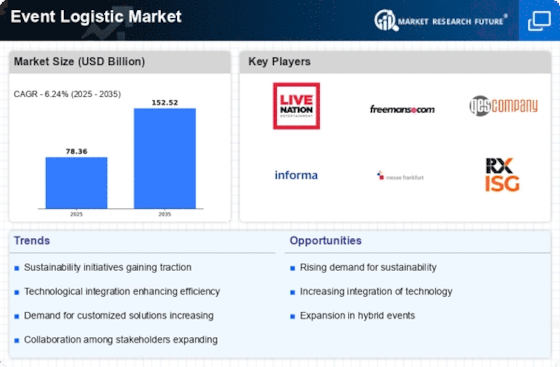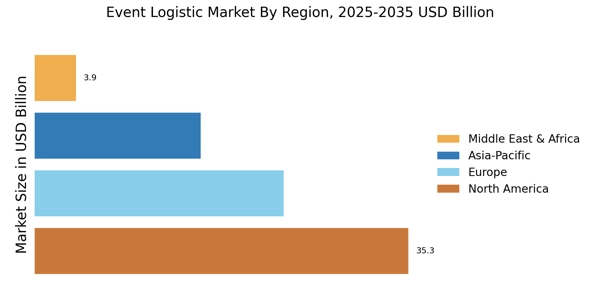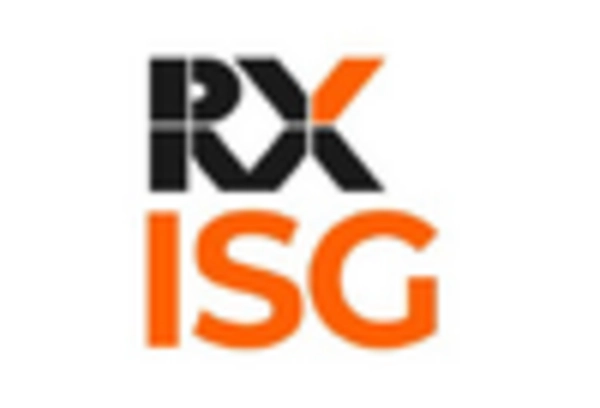Rising Demand for Hybrid Events
The Event Logistic Market is experiencing a notable increase in demand for hybrid events, which combine in-person and virtual elements. This trend appears to be driven by the need for flexibility and broader audience reach. According to recent data, hybrid events can attract up to 30% more attendees compared to traditional formats. As organizations seek to maximize engagement and participation, logistics providers are adapting their services to accommodate this shift. This includes the integration of advanced technology for seamless virtual experiences, which is becoming a critical component of event logistics. The ability to manage both physical and digital components effectively is likely to enhance the overall attendee experience, thereby positioning logistics companies as essential partners in the planning and execution of hybrid events.
Growth of Experiential Marketing
The rise of experiential marketing is reshaping the Event Logistic Market, as brands increasingly seek to create memorable experiences for their audiences. This trend emphasizes the importance of logistics in delivering immersive events that engage participants on multiple levels. Data suggests that experiential marketing campaigns can yield a return on investment that is up to five times higher than traditional advertising methods. As a result, logistics providers are tasked with ensuring that every aspect of the event, from setup to execution, aligns with the brand's vision and objectives. This growing focus on experiential marketing necessitates a high level of coordination and creativity in logistics planning, which may lead to the emergence of specialized service providers. The ability to craft unique experiences is likely to become a key differentiator in the competitive landscape of event logistics.
Increased Focus on Sustainability
Sustainability initiatives are becoming increasingly prominent within the Event Logistic Market. As environmental concerns gain traction, event organizers are prioritizing eco-friendly practices in logistics. This includes the use of sustainable materials, waste reduction strategies, and carbon offset programs. Recent studies indicate that approximately 70% of event planners are now considering sustainability as a key factor in their logistics decisions. This shift not only reflects a growing awareness of environmental issues but also aligns with consumer preferences for responsible practices. Consequently, logistics providers are compelled to innovate and offer sustainable solutions, which may enhance their competitive edge in the market. The emphasis on sustainability is likely to reshape the logistics landscape, encouraging collaboration between event organizers and logistics companies to achieve shared environmental goals.
Expansion of the Global Event Industry
The expansion of the event industry is a driving force behind the growth of the Event Logistic Market. As more organizations recognize the value of live events for networking and brand promotion, the demand for comprehensive logistics services is increasing. Recent projections indicate that the event industry is expected to grow at a compound annual growth rate of 11% over the next five years. This growth is prompting logistics companies to enhance their service offerings, ensuring they can meet the diverse needs of clients. Furthermore, the rise of international events necessitates a deeper understanding of cross-border logistics, including customs regulations and transportation challenges. As the event industry continues to flourish, logistics providers that can navigate these complexities are likely to thrive, positioning themselves as indispensable partners in the successful execution of events.
Technological Advancements in Logistics
Technological advancements are significantly influencing the Event Logistic Market, as logistics providers increasingly adopt innovative solutions to enhance efficiency and effectiveness. The integration of artificial intelligence, data analytics, and automation is streamlining operations, from inventory management to transportation logistics. For instance, the use of AI-driven tools can optimize route planning, reducing transportation costs by up to 20%. Additionally, real-time tracking systems are improving transparency and communication between stakeholders, which is essential for successful event execution. As technology continues to evolve, logistics companies that embrace these advancements are likely to gain a competitive advantage, positioning themselves as leaders in the event logistics sector. The ongoing digital transformation is expected to redefine traditional logistics practices, making them more agile and responsive to the dynamic needs of the event industry.
.png)

















